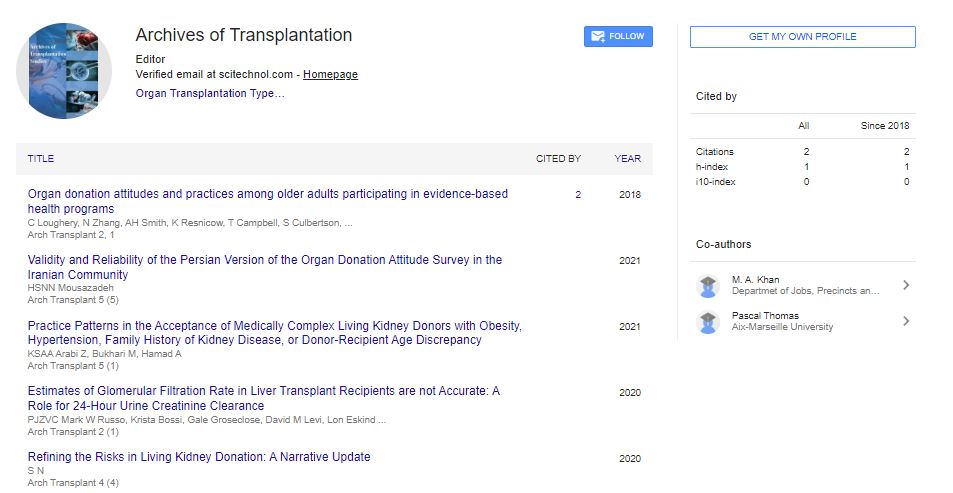Opinion Article, Arch Transplant Vol: 7 Issue: 1
Transplant Immunology: Immune System Reaction on Transplanted Organs
Hareg Zewdu*
Department of Immunology, University of South Australia, South Australia, Australia
*Corresponding Author: Hareg Zewdu
Department of Immunology, University of South Australia, South Australia, Australia
E-mail: zewdu90@gmail.com
Received date: 17 February, 2023, Manuscript No. AT-23-96351;
Editor assigned date: 20 February, 2023, PreQC No. AT-23-96351 (PQ);
Reviewed date: 06 March, 2023, QC No. AT-23-96351;
Revised date: 13 March, 2023, Manuscript No. AT-23-96351 (R);
Published date: 20 March, 2023, DOI: 10.4172/AT.1000133
Citation: Zewdu H (2023) Transplant Immunology: Immune System Reaction on Transplanted Organs. Arch Transplant 7:1?????????????????????.
Description
Transplantation is the process of transferring an organ, tissue, or cells from one individual (the donor) to another (the recipient) for the purpose of replacing damaged or diseased tissues. While transplantation has revolutionized modern medicine, it remains a complex and challenging procedure that involves multiple medical disciplines, including immunology.
Transplant immunology is the study of how the immune system reacts to transplanted organs, tissues, or cells. It is a essential aspect of transplantation medicine as it helps researchers and physicians understand the mechanisms that cause rejection and how to prevent it. In this article, we will explore the basics of transplant immunology, including the immune response to transplantation, types of transplant rejection, and current strategies for preventing and treating rejection.
The immune response to transplantation
The immune system plays an important role in transplantation because it has the ability to recognize foreign antigens, such as those on the surface of transplanted organs or tissues, and mount an immune response against them. The immune response to transplantation can be divided into two stages: the initial innate immune response and the subsequent adaptive immune response.
The innate immune response occurs immediately after transplantation and involves the activation of various immune cells, including neutrophils, natural killer cells, and dendritic cells. These cells release cytokines and chemokines, which recruit other immune cells to the site of transplantation and initiate the adaptive immune response.
The adaptive immune response is a more specific and targeted response that involves the activation of T cells and B cells. T cells are responsible for recognizing foreign antigens and activating other immune cells to attack them. B cells produce antibodies that specifically target and neutralize foreign antigens.
Types of transplant rejection
Transplanted organs, tissues, or cells can be rejected by the recipient's immune system in three ways: Hyperacute rejection, acute rejection, and chronic rejection.
Hyperacute rejection occurs within minutes to hours after transplantation and is caused by pre-existing antibodies in the recipient's blood that react with the transplanted organ. This type of rejection is rare and can usually be prevented by cross-matching the donor and recipient blood before transplantation.
Acute rejection occurs within days to months after transplantation and is the most common type of rejection. It is caused by the activation of the recipient's immune system against the transplanted organ or tissue. Acute rejection can be treated with immunosuppressive drugs, which suppress the recipient's immune system and prevent it from attacking the transplanted organ.
Chronic rejection occurs months to years after transplantation and is a gradual and progressive loss of function of the transplanted organ. It is caused by a chronic immune response that damages the blood vessels and tissues of the transplanted organ. Chronic rejection is difficult to treat and often leads to the failure of the transplanted organ.
Current strategies for preventing and treating rejection
The primary strategy for preventing transplant rejection is immunosuppression, which involves the use of drugs that suppress the recipient's immune system. Immunosuppressive drugs are used before and after transplantation to prevent acute rejection and to maintain long-term graft survival. However, these drugs have side effects, and long-term use can lead to complications such as infections, cancers, and metabolic disorders.
Other strategies for preventing transplant rejection include the use of donor-specific transfusions, which involve transfusing the recipient with blood from the same donor before transplantation, and the induction of tolerance, which involves training the recipient's immune system to recognize the transplanted organ as "self" and not attack it.
Conclusion
Transplant immunology is a complex and rapidly evolving field that is essential to the success of transplantation medicine. Understanding the immune response to transplantation, types of transplant rejection, and current strategies.
